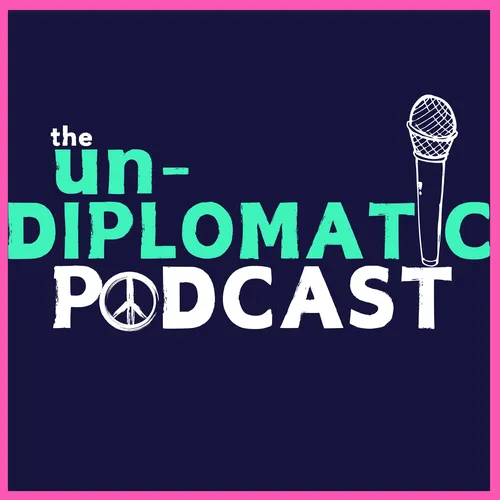
The Un-Diplomatic Podcast
Global power politics, for the people. Hosted by Van Jackson, Julia Gledhill, and Matt Duss. The views expressed are theirs alone (not those of any institution or employer).
- Update frequency
- every 6 days
- Average duration
- 49 minutes
- Episodes
- 259
- Years Active
- 2019 - 2025

The Possibilities of Progressive Worldmaking | Ep. 177
This interview with the Review of Democracy podcast is the deepest dive to date on Van Jackson’s book, Grand Strategies of the Left: The Foreign Policy of Progressive Worldmaking.
Subscribe to the Un…

Guam, War, and the Non-Sovereign Pacific, w/ Kenneth Gofigan Kuper | Ep. 176
What does Guam’s political status say about US strategic thought? What strategic choices does Guam have if it were allowed self-determination? What does America’s imperial relations with Guam have in…

Inequality, IR Theory, and the Imperial Blind Spot | Ep. 175
This episode is unusual, more like part of a mini-lecture series. I was asked to give a talk recently on inequality, development, and IR theory for an audience that skews quite young. I’ve chopped it…

The Left Debates Foreign Policy! | Ep. 174
What’s wrong with liberal internationalism? What alternatives do socialists and progressives offer? Is voting more (or less) than a defensive tactic? Is the Democratic Party beyond redemption? Is Chi…

Silicon Valley’s Galactic Colony Fetish, w/ Alina Utrata | Ep. 173
How do the space-colony visions of Elon Musk and Jeff Bezos meaningfully differ? What does a company like Space-X have in common with the old imperial company-states, like the British East India Comp…

The Reactionary Worldmaking of Counter-Insurgency, w/ Joseph Mackay | Ep. 172
What separates conservatives from reactionaries, and where do they converge? What are the politics inherent to counterinsurgency strategy? What does the popularity of counter-insurgency in the 21st c…

Death of the Think-Tanker w/ Matthew Petti | Ep. 171
What made Daniel Ellsberg—the famed Pentagon Papers whistleblower—different from today’s public intellectuals? How has the think tank environment in Washington changed over the decades? Why were the …

Robbie Shilliam on Frontier Imperialism and Post-BLM International Relations | Ep. 170
After George Floyd’s police murder and the Black Lives Matter movement explosion in 2020, the field of international relations rushed to engage the topic of race after ignoring it for half a century.…

Adom Getachew: W.E.B. Du Bois’s International Thought | Ep. 169
In this episode, Van sits down with Adom Getachew to talk about W.E.B. Du Bois’s life and Du Bois-ian thought as a prism for making sense of the world, including: The global color line and its limits…

The Writers' Strike, Global Film, and Entertainment Multipolarity, w/ Kevin Fox | Ep. 168
Have you ever wondered about the political economy of movie-making?
Like, why are Hollywood movies globally hegemonic, and why is South Korea its only rival, and why are most foreign countries mere ba…

Live Show! China, US Grand Strategy, and the Inequality Problem | Ep. 167
I just gave a talk to a section of the New Zealand Institute of International Affairs—a great group of a couple dozen Gen Z’ers, at a nice little bar in Wellington. What started out as shooting the s…

Fighting Pentagon Graft, w/ William Hartung and Julia Gledhill
This episode doesn’t just have a theme, it has a thesis. Have you wondered how precisely the Pentagon manages to siphon so much taxpayer money year after year? How the military-industrial-congression…

Dissident Thinking, Foreign Policy for the Middle Class, and Progressive Fissures Around Militarism | Ep. 165
In this cross-over episode with the Security Dilemma podcast, Van speaks with Patrick Fox and John Allen Gay of the John Quincy Adams Society about a range of issues: dissident thinking and intellect…

Part II: Classical Realism Versus International Relations, Interview w/ Jonathan Kirshner | Ep. 164
Part II of my conversation with Jonathan Kirshner about his new book, An Unwritten Future: Realism, Uncertainty, and World Politics. Kirshner explains how classical realists think about the “national…

Part I: Classical Realism Versus International Relations, Interview w/ Jonathan Kirshner | Ep. 163
Part I of my two-part conversation with Jonathan Kirshner about his new book, An Unwritten Future: Realism, Uncertainty, and World Politics. Kirshner explains why classical realism is a misunderstood…

Rethinking International Order: 15th Century Maritime Asia and Today w/ Manjeet Pardesi | Ep. 162
What's the difference between centered and de-centered international orders? How do small states navigate geopolitics without becoming pawns? What does it look like to have a world in which there is …

American Hegemony v. New Zealand's 'Independent' Foreign Policy | Ep. 161
What's wrong with liberal hegemony? What does it mean for New Zealand to have an "independent foreign policy?" Why did New Zealand's Prime Minister recently visit China? And why are the interests of …

How China Thinks About Asian Security Order, w/ Carla Freeman | Ep. 160
Van sat down with China watcher Carla Freeman (US Institute of Peace) to explore this thing Xi Jinping announced last year called the “Global Security Initiative,” which turned into a larger discussi…

Where is Thailand Now? w/ Aim Sinpeng and Greg Raymond
Opposition parties carried the day in Thailand's recent multiparty elections on May 14. The Move Forward Party, led by Pita Limjaroenrat, and Phue Thai party of Thaksin Shinawatra's family, won a siz…

Unmaking Asian Exceptionalism, w/ Gaiutra Bahadur | Ep. 158
What does it mean to write with not just logos but pathos? How has racial violence in America shaped the identity of Asian-Americans? Why is the "model minority" myth so problematic? And what possibi…